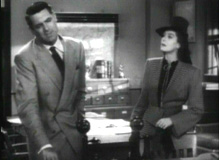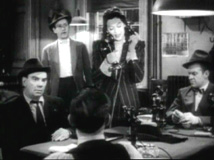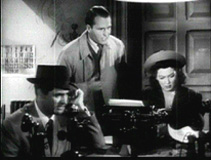His Girl Friday (Howard Hawks, 1940)
 Howard Hawks’ superb screwball workplace comedy His
Girl Friday is one of those classics that manages to convince new viewers of
its greatness despite any inflated expectations caused by its sky-high
reputation. It’s dated exceptionally well, perhaps because it’s a comedy of
frazzled nerves that’s so cynical that it doesn’t even take itself
seriously, but mainly because it and The
Front Page, the play that it has been adapted from, have served as the
prototype for so many subsequent films in its genre. The brilliant decision to
change the movie’s lead character into a woman (she was a he in both the play
and in its original film adaptation) results in a leading lady that’s
unusually empowered for the era and an equal to Cary Grant’s romantic lead.
Rosalind Russell imbues her Hildy Johnson with such unbelievable energy that one
can’t help but root for her. She goes on about how she wants to be a human
being instead of a “newspaperman”, but she’s so appealing precisely
because she’s the sort of fast-talking, quick-thinking creation that could
only exist in the movies.
Howard Hawks’ superb screwball workplace comedy His
Girl Friday is one of those classics that manages to convince new viewers of
its greatness despite any inflated expectations caused by its sky-high
reputation. It’s dated exceptionally well, perhaps because it’s a comedy of
frazzled nerves that’s so cynical that it doesn’t even take itself
seriously, but mainly because it and The
Front Page, the play that it has been adapted from, have served as the
prototype for so many subsequent films in its genre. The brilliant decision to
change the movie’s lead character into a woman (she was a he in both the play
and in its original film adaptation) results in a leading lady that’s
unusually empowered for the era and an equal to Cary Grant’s romantic lead.
Rosalind Russell imbues her Hildy Johnson with such unbelievable energy that one
can’t help but root for her. She goes on about how she wants to be a human
being instead of a “newspaperman”, but she’s so appealing precisely
because she’s the sort of fast-talking, quick-thinking creation that could
only exist in the movies.
 The most distinguishing characteristic of Friday
is its rapid-fire, overlapping delivery of dialogue. With a cast that’s
working at peak levels, the movie prattles along at a breakneck pace, barely
giving the viewer a chance to breathe between giggles. Even the brief silence
during a double-take seems deafening in this loudmouthed context. Because the
frenetic pace is so well sustained throughout, whenever it lets up to allow
genuine emotion to shine through, it has the added benefit of giving the
audience a much-needed chance to catch their breath. Consider, for example, the
sublime moment when Cary Grant’s slick newspaper editor finds out that his
star reporter and ex-wife is about to marry again. For the first time, he stops
babbling, scheming, and blowing his hilarious hot air. He staggers silently for
a moment before saying, “You knocked the wind out of my sails,” and
immediately becomes something more than an automaton. Throughout, whenever the
pace momentarily slows down, it’s so Hawks can better establish the emotional
grounding of his characters. Before the film launches into its cacophonous
second act, with Hildy’s arrival at a prison’s press room, Hawks allows a
scene that establishes the camaraderie that exists between the reporters.
Similarly, when one edgy character later wails about them, “They ain’t
human!” and Hildy replies, “I know… they are newspapermen,” Hawks
follows the outburst with a sobering scene in which the men show remorse for
having gone too far in their joking.
The most distinguishing characteristic of Friday
is its rapid-fire, overlapping delivery of dialogue. With a cast that’s
working at peak levels, the movie prattles along at a breakneck pace, barely
giving the viewer a chance to breathe between giggles. Even the brief silence
during a double-take seems deafening in this loudmouthed context. Because the
frenetic pace is so well sustained throughout, whenever it lets up to allow
genuine emotion to shine through, it has the added benefit of giving the
audience a much-needed chance to catch their breath. Consider, for example, the
sublime moment when Cary Grant’s slick newspaper editor finds out that his
star reporter and ex-wife is about to marry again. For the first time, he stops
babbling, scheming, and blowing his hilarious hot air. He staggers silently for
a moment before saying, “You knocked the wind out of my sails,” and
immediately becomes something more than an automaton. Throughout, whenever the
pace momentarily slows down, it’s so Hawks can better establish the emotional
grounding of his characters. Before the film launches into its cacophonous
second act, with Hildy’s arrival at a prison’s press room, Hawks allows a
scene that establishes the camaraderie that exists between the reporters.
Similarly, when one edgy character later wails about them, “They ain’t
human!” and Hildy replies, “I know… they are newspapermen,” Hawks
follows the outburst with a sobering scene in which the men show remorse for
having gone too far in their joking.
 Hawks’ snappy edits during His Girl Friday’s bridging montages keep up with the pace of the
delivery in the dialogue scenes. While the characters are speaking, the director
shoots with his typically, unobtrusive efficiency, always placing the camera
precisely where it won’t call any attention away from the action. The stage
play’s seams show most obviously during a scene in which a procession of
reporters run into the press room with updates from a surging prison riot, but
Hawks minimizes the feel that it’s a stagy plot device by placing it right
after the jailbreak sequence, which is decidedly cinematic. His work with his
actors is incredible enough to make one forget that a good forty-five minutes
goes by without face to face conversation between the two leads. Because
there’s never a dull moment in those forty-five minutes, the chemistry never
starts fading. When Grant and Russell are together, it’s apparent to the
audience that since Burns knows to appeal to Hildy’s sense of pride to get
what he wants from her, the rules of the genre dictate that he’s perfect for
her. As for Hildy, her contradictions only make her more loveable. At one point,
she chastises the corrupt mayor by shouting, “You’d hang your own mother to
be re-elected,” but because she’s demonstrated that she’d do the same to
get a scoop, it doesn’t feel the least bit sanctimonious. That should hardly
come as a surprise though: His Girl Friday
is too busy being funny to have time for such unnecessary moralizing.
Hawks’ snappy edits during His Girl Friday’s bridging montages keep up with the pace of the
delivery in the dialogue scenes. While the characters are speaking, the director
shoots with his typically, unobtrusive efficiency, always placing the camera
precisely where it won’t call any attention away from the action. The stage
play’s seams show most obviously during a scene in which a procession of
reporters run into the press room with updates from a surging prison riot, but
Hawks minimizes the feel that it’s a stagy plot device by placing it right
after the jailbreak sequence, which is decidedly cinematic. His work with his
actors is incredible enough to make one forget that a good forty-five minutes
goes by without face to face conversation between the two leads. Because
there’s never a dull moment in those forty-five minutes, the chemistry never
starts fading. When Grant and Russell are together, it’s apparent to the
audience that since Burns knows to appeal to Hildy’s sense of pride to get
what he wants from her, the rules of the genre dictate that he’s perfect for
her. As for Hildy, her contradictions only make her more loveable. At one point,
she chastises the corrupt mayor by shouting, “You’d hang your own mother to
be re-elected,” but because she’s demonstrated that she’d do the same to
get a scoop, it doesn’t feel the least bit sanctimonious. That should hardly
come as a surprise though: His Girl Friday
is too busy being funny to have time for such unnecessary moralizing.
* * * * Masterpiece
03-12-03
Jeremy Heilman